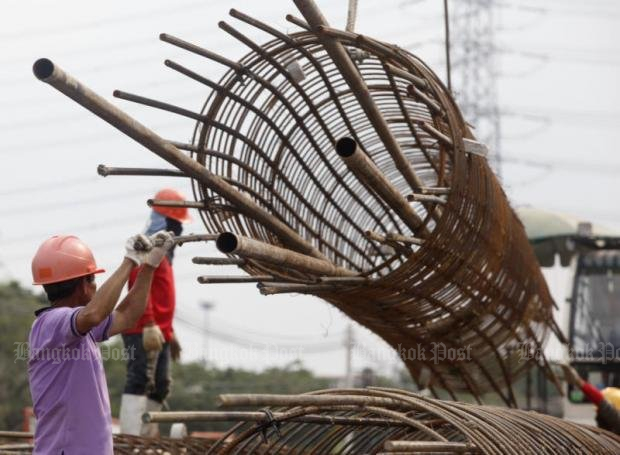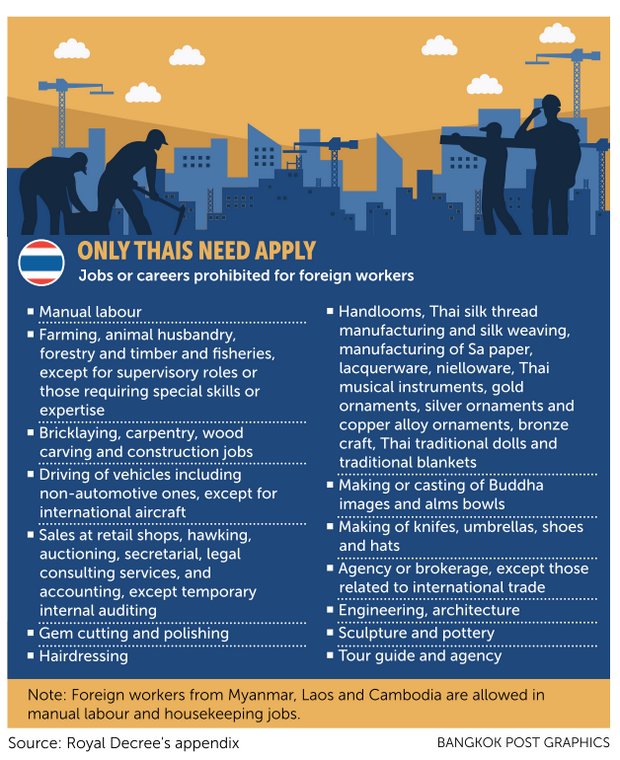Thailand: Uproar over new labour law
The private sector says local companies, particularly small and medium-sized enterprises, are likely to be hurt by the new Royal Decree on Recruitment of Foreigners, as the tighter law with massive fines for employers could cut SMEs’ competitive advantage at a time when the economy has yet to fully recover.
Thai Chamber of Commerce (TCC) chairman Kalin Sarasin said his group and other private associations are brainstorming solutions and have sent word to the government demanding a quick response.
“At this stage, hundreds of TCC members are trying to evaluate the impact of this new law on their business,” Mr Kalin said.
Chen Namchaisiri, chairman of the Federation of Thai Industries, said the FTI sent an open letter to the Labour Ministry requesting that related state agencies seek solutions and policies to reduce the adverse impact of tighter labour regulations. “We have got many complaints from our members that many companies, especially SMEs, were badly affected by the implementation of the Royal Decree on Recruitment of Foreigners,” Mr Chen said, adding that the law took effect on June 23.
 He said the FTI also acted on behalf of the Joint Standing Committee on Commerce, Industry and Banking (JSCCIB) by sending a request to the government for a proper solution.
He said the FTI also acted on behalf of the Joint Standing Committee on Commerce, Industry and Banking (JSCCIB) by sending a request to the government for a proper solution.
The new law is unlikely to harm giant companies because they have the resources to recruit foreigners in compliance with the law, Mr Chen said.
The definition of “recruitment of foreigners” covers migrant workers and cheap labour brought in from the neighbouring countries of Cambodia, Laos, Myanmar and Vietnam. Those labourers play a crucial role in production at Thai SMEs. According to the Royal Decree on Recruitment of Foreigners, the aim is to raise the standards of recruitment and management of labour and avoid accusations of abuse or even human trafficking by the international community.
The law contains stronger punishments for both civil and criminal wrongdoing, with fines ranging as high as 400,000-800,000 baht.
The fines are imposed at progressive rates: the more migrant workers the employer has, the higher the fine the employer faces.
“That is too much for employers who fail to comply with the law and pay a fine that would cause a huge burden and reduce the competitive advantage of Thai SMEs, which are struggling to survive,” Mr Chen said. Chanintr Chalisarapong, the president of the Thai Tuna Industry Association (TTIA), said the new law will hurt not only employers but also employees, particularly migrant workers with lesser skills.
“And the lack of those migrant workers at a time that SMEs still need cheap labour to operate could mean disruptions to the Thai economy, which is on the recovery path,” Mr Chanintr said.
 According to the TTIA, there are more than 2 million migrant workers in Thailand and most have yet to properly register and are likely in violation of the law.
According to the TTIA, there are more than 2 million migrant workers in Thailand and most have yet to properly register and are likely in violation of the law.
“We demand that the government seek some rescue measures to reduce adverse effects on the real sector, which still badly needs those migrant workers, especially the SMEs,” Mr Chanintr said.
Thirapat Chirapipat, managing director of contractor Chiangmai Rimdoi Plc, said the new regulations related to alien workers present a fresh risk for the construction sector.
“The new regulations may cause a labour shortage,” Mr Thirapat said. “Costs will also be higher because we rely on 80-90% alien workers.”
He said Chiangmai Rimdoi will account for the rising cost of labour when it makes new bids to maintain profit levels. It will also reduce its dependence on alien workers.
Furthermore, the firm expects a minimal impact because it uses subcontractors for its jobs, Mr Thirapat said.
Source: http://www.bangkokpost.com/business/news/1277495/uproar-over-new-labour-law


 English
English




